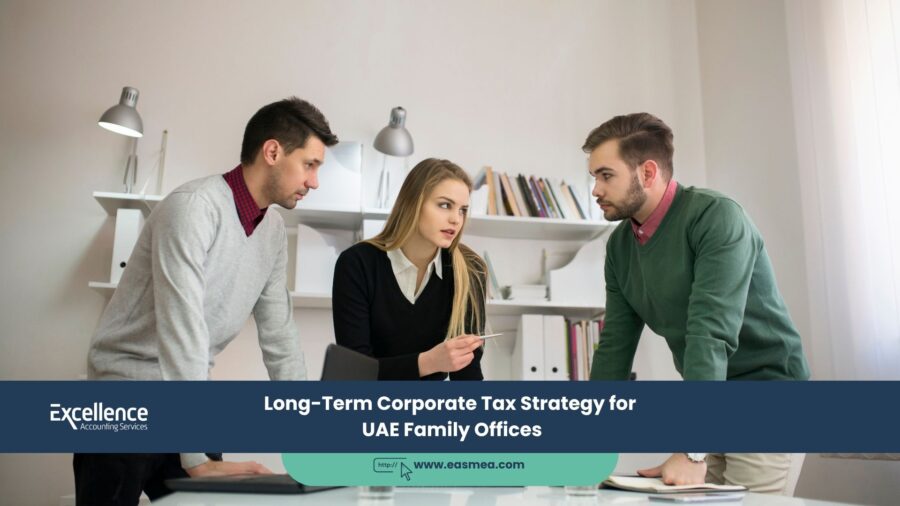Long-Term Corporate Tax Strategy for UAE Family Offices
For generations, family offices in the UAE have been the silent stewards of wealth, operating with a degree of privacy and informal governance that a zero-tax environment afforded. With the introduction of the UAE Corporate Tax (CT), this paradigm has fundamentally shifted. The new legislation is more than just a compliance exercise; it is a catalyst compelling family offices to evolve, to formalize their structures, and to adopt a sophisticated, long-term strategic approach to tax planning. The core objectives—wealth preservation, seamless inter-generational transfer, and continued growth—remain the same, but the path to achieving them now runs directly through a robust and proactive tax strategy.
- Long-Term Corporate Tax Strategy for UAE Family Offices
- Part 1: The New Imperative - From Informal to Institutional
- Part 2: Foundational Pillar 1 - Engineering the Optimal Holding Structure
- Part 3: Foundational Pillar 2 - A Tax-Aware Approach to Asset Management
- Part 4: Foundational Pillar 3 - Governance, Succession, and Compliance
- How Excellence Accounting Services (EAS) Can Help
- Frequently Asked Questions (FAQs)
- Secure Your Family's Legacy for Generations
A family office is a unique entity, blending personal wealth with corporate structures and managing a diverse portfolio that can span real estate, private equity, global securities, and operating businesses. This complexity creates a unique set of challenges and opportunities under the CT law. A reactive, year-to-year approach to tax will be inefficient and risky. Instead, a successful long-term strategy requires a holistic view, integrating legal structures, investment decisions, and succession planning into a single, tax-aware framework. This guide provides a strategic roadmap for UAE family offices to navigate this new era, focusing on the foundational pillars required to build a resilient, tax-efficient structure for the generations to come.
Key Strategic Takeaways for Family Offices
- Formal Structure is Essential: Ad-hoc arrangements must be replaced with formal legal structures, such as a holding company, to manage assets and liabilities efficiently.
- Leverage Key Exemptions: The Participation Exemption is the most powerful tool for a family office, allowing tax-free receipt of dividends and tax-free disposal of shares in subsidiaries.
- Holding Company as the Cornerstone: Establishing a dedicated holding company is crucial for centralizing management, optimizing tax liabilities, and simplifying succession.
- Proactive Succession Planning: Corporate Tax has direct implications for the transfer of wealth. A tax strategy must be integrated with the family’s succession plan to prevent value erosion.
- Professional Governance is Non-Negotiable: Maintaining arm’s length transaction principles, robust documentation, and professional accounting and bookkeeping are now essential for compliance.
Part 1: The New Imperative – From Informal to Institutional
The transition to a corporate tax environment necessitates a profound change in mindset for many family offices. What was previously managed through personal relationships and informal agreements must now be institutionalized. The risks of maintaining the status quo are significant.
Challenges Unique to Family Offices:
- Diverse and Complex Asset Classes: A typical family office portfolio is not homogenous. It includes illiquid assets like real estate and private equity, alongside liquid financial instruments, each with different tax treatments.
- Intermingling of Personal and Corporate Assets: The line between family wealth and business assets can often be blurred. The CT law demands clear legal and financial separation.
- Multi-Jurisdictional Operations: Many family offices hold assets globally. This creates a complex interplay between UAE CT, foreign taxes, and Double Taxation Avoidance Agreements (DTAAs).
- Family Dynamics and Governance: Decision-making can be influenced by family relationships. The CT law requires that all transactions, especially those between related parties, are conducted on a formal, arm’s length basis.
The introduction of Corporate Tax is a strategic opportunity to review, streamline, and strengthen the family’s entire wealth management structure for long-term resilience.
Part 2: Foundational Pillar 1 – Engineering the Optimal Holding Structure
The single most important strategic decision for a family office is the design of its legal holding structure. A well-designed structure is the foundation upon which all other tax efficiencies are built.
The Central Role of a Holding Company
A family holding company is a corporate entity established with the primary purpose of holding shares in other companies (subsidiaries) and managing the family’s investment portfolio. Its benefits under the CT law are immense:
- Centralized Asset Management: It consolidates ownership of various assets, simplifying administration and governance.
- Risk Mitigation: It segregates liabilities, protecting personal family wealth from the risks of individual operating businesses.
- Tax Efficiency through Participation Exemption: This is the holding company’s superpower. It can receive dividends from its subsidiaries and sell shares in those subsidiaries completely tax-free, provided certain conditions are met.
Mastering the Participation Exemption
This exemption is designed to prevent double taxation and is vital for family offices. To qualify, the holding company’s investment must be a “Participating Interest,” which means:
- It holds at least 5% of the shares in the subsidiary.
- It has held them (or intends to hold them) for an uninterrupted period of 12 months.
- The subsidiary is subject to a corporate tax of at least 9% in its jurisdiction (this prevents shifting profits to zero-tax havens).
This allows a family to extract profits from their operating businesses via dividends to the holding company without a tax leakage, and to restructure their portfolio by selling businesses without triggering a large tax bill. Designing a structure to meet these conditions requires expert business consultancy.
Considering a Tax Group
If a family office controls multiple UAE-resident companies, it can apply to the FTA to form a Tax Group. This allows the group to be treated as a single taxable person.
Benefits include:
- Loss Offsetting: Losses from one group company can be automatically offset against profits from another, reducing the group’s total tax bill.
- Simplified Reporting: Only one consolidated tax return is filed for the entire group.
- Tax-Free Intra-Group Transactions: All transactions between group members are disregarded for tax purposes, simplifying administration.
Part 3: Foundational Pillar 2 – A Tax-Aware Approach to Asset Management
A long-term strategy requires evaluating every investment decision through a tax lens.
Real Estate Investments
Rental income from UAE properties held by the family office’s corporate entities is taxable. Gains on the disposal of these properties are also taxable. The strategy here involves holding property in the right entity and managing financing costs (interest expenses are generally deductible) to optimize the net taxable income.
Financial Investments (Stocks and Bonds)
The law provides an exemption for certain investment income to avoid disincentivizing capital market activity. Dividends and capital gains from shares listed on a recognized stock exchange are generally exempt from CT. For unlisted shares, the Participation Exemption is the key relief.
International Portfolio Management
For assets held abroad, the family office must consider:
- Double Taxation Treaties: The UAE has an extensive network of DTAAs. A long-term strategy involves structuring investments through jurisdictions that have favorable treaties with both the UAE and the country of investment to reduce withholding taxes on dividends and interest.
- Foreign Tax Credits: If the family office pays foreign tax on income that is also subject to UAE CT, it can claim a credit for the foreign tax paid, up to the amount of the UAE CT due on that same income.
Part 4: Foundational Pillar 3 – Governance, Succession, and Compliance
The “soft” aspects of family office management are now “hard” compliance requirements.
Integrating Tax with Succession Planning
Corporate Tax directly impacts how wealth is transferred. Gifting shares in the family holding company to the next generation can be a complex tax event. A long-term strategy might involve using trusts or foundations in conjunction with the corporate structure to ensure a smooth and tax-efficient transfer of control and economic benefit. This requires a combination of legal and high-level financial advice, such as that provided by CFO services.
The Importance of Arm’s Length Dealings
Any transaction between the family office and a family member or a related business must be priced as if it were between independent parties. This includes salaries paid to family members, rent charged for properties, or loans provided. Failure to do so can result in the FTA adjusting the transaction to market value and imposing penalties.
The Non-Negotiable Role of Technology
Managing a complex web of legal entities and assets requires a sophisticated accounting system. A platform like Zoho Books provides the necessary infrastructure to:
- Maintain separate, audited financial statements for each legal entity.
- Track inter-company transactions and balances accurately.
- Generate the financial reporting needed for consolidated tax returns.
A professional accounting system implementation is the bedrock of good governance and tax compliance.
How Excellence Accounting Services (EAS) Can Help
EAS provides bespoke, confidential advisory services tailored to the unique needs of UAE family offices, helping them navigate the complexities of Corporate Tax with a strategic, long-term perspective.
- Holistic Tax Strategy and Structuring: We work with you to design and implement the optimal legal and holding structure, leveraging holding companies, tax groups, and the Participation Exemption.
- Succession Planning Advisory: Our senior advisors collaborate with your legal team to integrate tax planning into your succession strategy, ensuring wealth is preserved across generations.
- Outsourced CFO and Governance Services: We provide high-level CFO services to instill professional financial governance, manage treasury functions, and oversee compliance across your portfolio.
- Transaction and Valuation Advisory: For acquisitions, disposals, or restructuring, our business valuation and due diligence teams ensure all transactions meet arm’s length requirements.
- Comprehensive Compliance Management: We manage all aspects of your UAE Corporate Tax compliance, from record-keeping to return filing.
Frequently Asked Questions (FAQs)
It depends on the nature of its income. A holding company whose income is purely “Qualifying Income” (e.g., dividends and capital gains from subsidiaries) could potentially benefit from the 0% rate if established in a Qualifying Free Zone. However, if it earns any non-qualifying income (e.g., taxable rental income from a mainland property), that portion would be subject to the 9% rate. The structuring is complex and requires careful planning.
It is critically important. It allows your holding company to sell its stake in a private company (after holding it for 12+ months) without paying any tax on the capital gain. This is essential for the typical private equity model of buying, growing, and then exiting a business.
Generally, the primary taxing right on rental income and property gains belongs to the country where the property is located. If that income is then remitted to your UAE holding company, it may also be subject to UAE CT. However, you can typically claim a Foreign Tax Credit for the taxes already paid overseas to avoid double taxation.
The primary benefits are offsetting profits and losses between your different businesses (e.g., a profitable trading company’s income can be reduced by losses from a new startup venture) and eliminating the need to worry about transfer pricing on transactions between the group companies. It simplifies both tax liability and administration.
Salaries paid to family members are a deductible expense for the company, provided they reflect the fair market value for the actual services performed. The amount must be reasonable and justifiable based on the individual’s qualifications, experience, and role. Inflated salaries could be challenged and disallowed by the FTA.
No. Dividends and profit distributions from one UAE resident company to another (e.g., from an operating subsidiary to the family holding company) are exempt from Corporate Tax. This allows profits to be moved up to the holding company level tax-free.
This is an asset disposal and would normally trigger a taxable gain. However, if both companies are part of a Tax Group, the transfer is ignored for tax purposes. If they are not in a tax group but meet the 75% common ownership threshold, you can claim Intra-Group Transfer Relief to defer the gain, provided the property is not sold outside the group within two years.
It adds a significant layer of complexity. Simply transferring shares via a will could have tax consequences for the estate or the heirs. A modern succession plan must now incorporate corporate structures (like holding companies and trusts) that are designed to pass on control and economic value in the most tax-efficient manner possible under the CT law.
Yes, absolutely. Unless your companies are all part of a formally registered Tax Group, every transaction between them must be at arm’s length. This applies to loans, service fees, asset sales, etc. The family relationship does not negate the requirement for market-based pricing. The FTA requires formal transfer pricing documentation if you meet certain revenue thresholds.
No. The UAE Corporate Tax applies to businesses. An individual’s personal investment income (e.g., from a personal stock portfolio, rental income from a personally owned villa) is not within the scope of CT, provided this activity does not amount to a trade or business that requires a license.
Conclusion: Building a Legacy in the New Tax Era
The introduction of Corporate Tax in the UAE is not a challenge to the legacy of family offices but an invitation to strengthen it. It pushes for a transition from informal stewardship to professional, institutionalized governance. By embracing this change and developing a proactive, long-term tax strategy built on the pillars of optimal structure, tax-aware asset management, and robust governance, family offices can do more than just comply. They can build a more resilient, efficient, and enduring framework for wealth preservation and growth, ensuring their legacy thrives for generations to come in the new economic landscape of the UAE.




